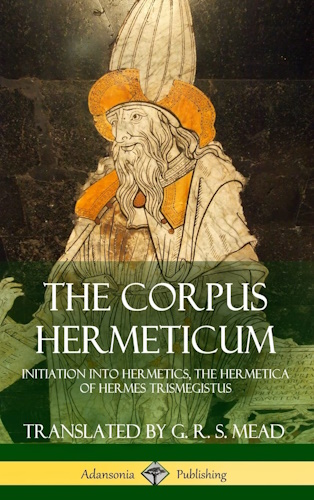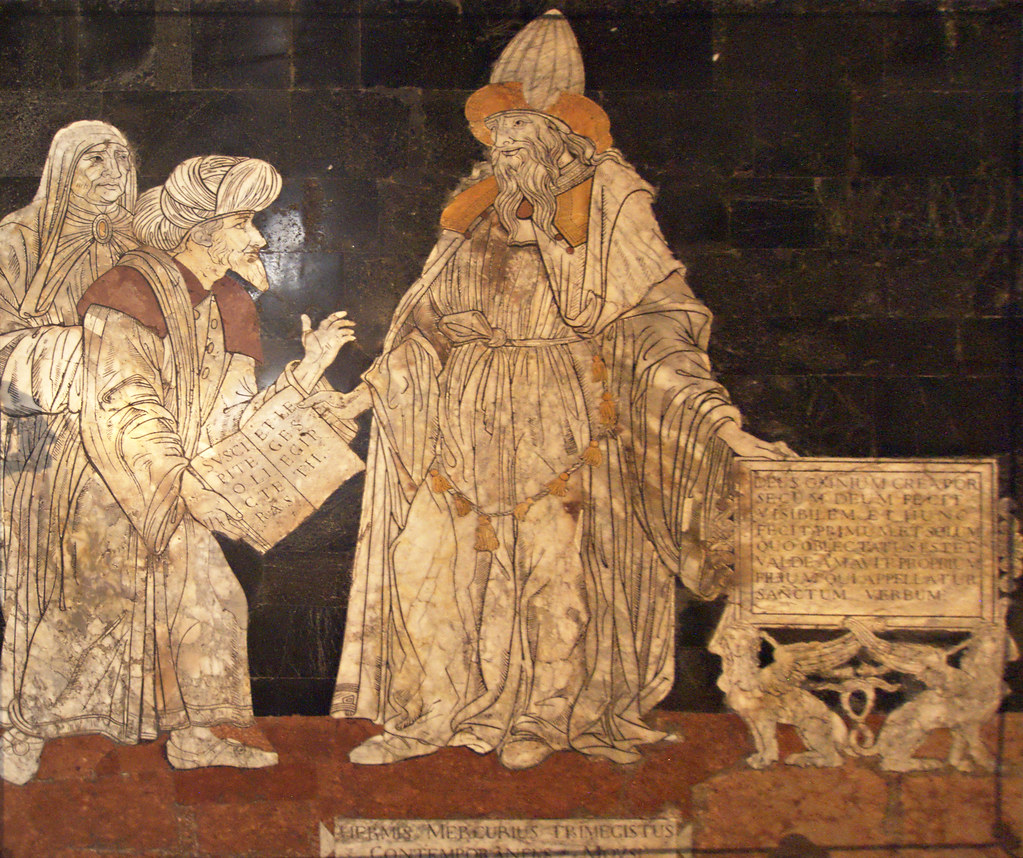
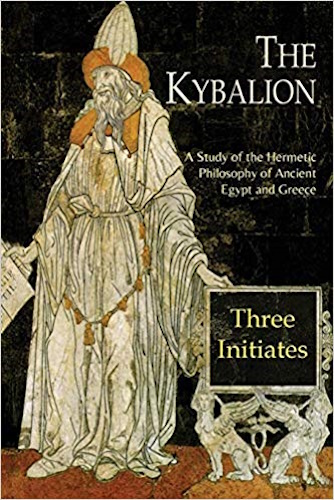

![Thrice-Greatest Hermes; Studies in Hellenistic Theosophy and Gnosis [Three Volumes in One] Thrice-Greatest Hermes; Studies in Hellenistic Theosophy and Gnosis [Three Volumes in One]](http://realityroars.com/images/affiliate-creative/thrice-greatest-hermes--studies-in-hellenistic-theosophy-and-gnosis.jpg)

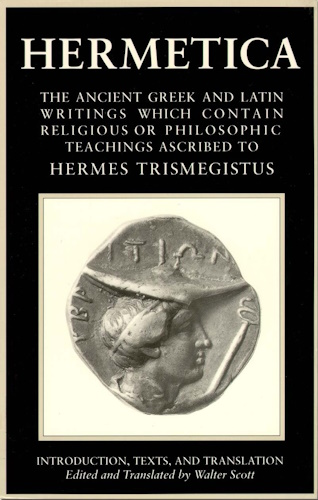



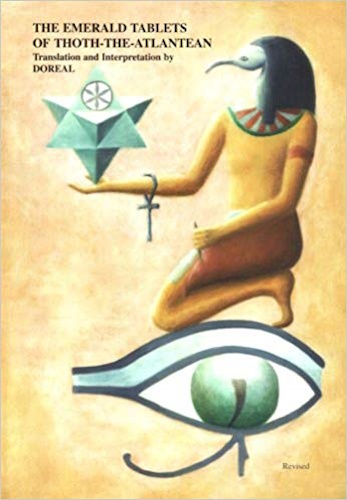

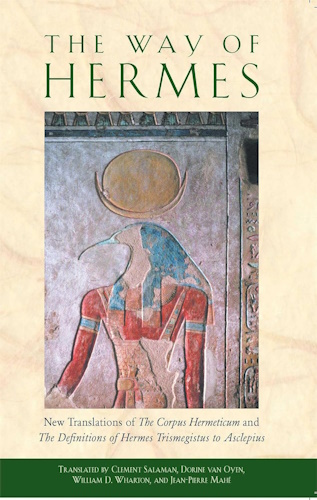

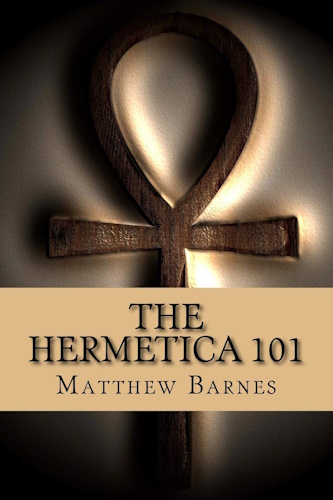

![]()
![]()
XV. The Definitions of Asclepius unto King Ammon
The Perfect Sermon of Asclepius unto the King
1. Great is the sermon (logos) which I send to thee, O King—the summing up and digest, as it were, of all the rest.
For it is not composed to suit the many's prejudice, since it contains much that refuteth them.
Nay, it will seem to thee as well to contradict sometimes my sermons too.
Hermes, my master, in many a conversation, both when alone, and sometimes, too, when Tat was there, has said, that unto those who come across my books, their composition will seem most simple and [most] clear; but, on the contrary, as 'tis unclear, and has the [inner] meaning of its words concealed, it will be still unclearer, when, afterwards, the Greeks will want to turn our tongue into their own,—for this will be a very great distorting and obscuring of [even] what has been [already] written.
2. Turned into our own native tongue, the sermon (logos) keepeth clear the meaning of the words (logoi) [at any rate].
For that its very quality of sound, the [very] power of the Egyptian names, have in themselves the bringing into act of what is said.
As far as, then, thou canst, O King—(and thou canst [do] all things)—keep [this] our sermon from translation; in order that such mighty mysteries may not come to the Greeks, and the disdainful speech of Greece, with [all] its looseness, and its surface beauty, so to speak, take all the strength out of the solemn and the strong—the energetic speech of Names.
The Greeks, O King, have novel words, energic of "argumentation" [only]; and thus is the philosophizing of the Greeks—the noise of words.
But we do not use words; but we use sounds full-filled with deeds.
3. Thus, then, will I begin the sermon by invocation unto God, the universals' Lord and Maker, [their] Sire, and [their] Encompasser; who though being All is One, and though being One is All; for that the Fullness of all things is One, and [is] in One, this latter One not coming as a second [One], but both being One.
And this is the idea that I would have thee keep, through the whole study of our sermon, Sire!
For should one try to separate what seems to be both All and One and Same from One,—he will be found to take his epithet of "All" from [the idea of] multitude, and not from [that of) fullness—which is impossible; for if he part All from the One, he will destroy the All.
For all things must be One—if they indeed are One. Yea, they are One; and they shall never cease being One—in order that the Fullness may not be destroyed.
4. See then in Earth a host of founts of Water and of Fire forth-spirting in its midmost parts; in one and the same [space all] the three natures visible—of Fire, and Water, and of Earth, depending from one Root.
Whence, too, it is believed to be the Treasur of every matter. It sendeth forth of its abundance, and in the place [of what it sendeth forth] receiveth the subsistence from above.
For thus the Demiurge—I mean the Sun—eternally doth order Heaven and Earth, pouring down Essence, and taking Matter up, drawing both round Himself and to Himself all things, and from Himself giving all things to all.
For He it is whose goodly energies extend not only through the Heaven and the Air, but also onto Earth, right down unto the lowest Depth and the Abyss.
[5. missing]
6. And if there be an Essence which the mind alone can grasp, this is his Substance, the reservoir of which would be His Light.
But whence this [Substance] doth arise, or floweth forth, He, [and He] only, knows.
Or rather, in space and nature, He is near unto Himself . . . though as He is not seen by us, … understand [Him] by conjecture.
7. The spectacle of Him, however, is not left unto conjecture; nay [for] His very rays, in greatest splendour, shine all round on all the Cosmos that doth lie above and lie below.
For He is stablished in the midst, wreathed with the Cosmos, and just as a good charioteer, He safely drives the cosmic team, and holds them in unto Himself, lest they should run away in dire disorder.
The reins are Life, and Soul, and Spirit, Deathlessness, and Genesis.
He lets it, then, drive [round] not far off from Himself—nay, if the truth be said, together with Himself.
8. And in this way He operates all things. To the immortals He distributeth perpetual permanence; and with the upper hemisphere of His own Light—all that he sends above from out His other side, [the side of him] which looks to Heaven—He nourisheth the deathless parts of Cosmos.
But with that side that sendeth down [its Light], and shineth round all of the hemisphere of Water, and of Earth, and Air, He vivifieth, and by births and changes keepeth in movement to and fro the animals in these [the lower] parts of Cosmos. …
9. He changes them in spiral fashion, and doth transform them into one another, genus to genus, species into species, their mutual changes into one another being balanced—just as He does when He doth deal with the Great Bodies.
For in the case of every body, [its] permanence [consists in] transformation.
In case of an immortal one, there is no dissolution; but when it is a mortal one, it is accompanied with dissolution.
And this is how the deathless body doth differ from the mortal, and how the mortal one doth differ from the deathless.
10. Moreover, as His Light's continuous, so is His Power of giving Life to lives continuous, and not to be brought to an end in space or in abundance.
For there are many choirs of daimons round Him, like unto hosts of very various kinds; who though they dwell with mortals, yet are not far from the immortals; but having as their lot from here unto the spaces of the Gods, they watch o'er the affairs of men, and work out things appointed by the Gods—by means of storms, whirlwinds and hurricanes, by transmutations wrought by fire and shakings of the earth, with famines also and with wars requiting [man's] impiety,—for this is in man's case the greatest ill against the Gods.
11. For that the duty of the Gods is to give benefits; the duty of mankind is to give worship; the duty of the daimons is to give requital.
For as to all the other things men do, through error, or foolhardiness, or by necessity, which they call Fate, or ignorance—these are not held requitable among the Gods; impiety alone is guilty at their bar.
12. The Sun is the preserver and the nurse of every class.
And just as the Intelligible World, holding the Sensible in its embrace, fills it [all] full, distending it with forms of every kind and every shape—so, too, the Sun distendeth all in Cosmos, affording births to all, and strengtheneth them.
When they are weary or they fail, He takes them in His arms again.
13. And under Him is ranged the choir of daimons—or, rather, choirs; for these are multitudinous and very varied, ranked underneath the groups of Stars, in equal number with each one of them.
So, marshalled in their ranks, they are the ministers of each one of the Stars, being in their natures good, and bad, that is, in their activities (for that a daimon's essence is activity); while some of them are [of] mixed [natures], good and bad.
14. To all of these has been allotted the authority o'er things upon the Earth; and it is they who bring about the multifold confusion of the turmoils on the Earth—for states and nations generally, and for each individual separately.
For they do shape our souls like to themselves, and set them moving with them,—obsessing nerves, and marrow, veins and arteries, the brain itself, down to the very heart.
15. For on each one of us being born and made alive, the daimons take hold on us—those [daimones] who are in service at that moment [of the wheel] of Genesis, who are ranged under each one of the Stars.
For that these change at every moment; they do not stay the same, but circle back again.
These, then, descending through the body to the two parts of the soul, set it awhirling, each one towards its own activity.
But the soul's rational part is set above the lordship of the daimons—designed to be receptacle of God.
16. Who then doth have a Ray shining upon him through the Sun within his rational part—and these in all are few on them the daimons do not act; for no one of the daimons or of Gods has any power against one Ray of God.
As for the rest, they are all led and driven, soul and body, by the daimons—loving and hating the activities of these.
The reason (logos), [then,] is not the love that is deceived and that deceives.
The daimons, therefore, exercise the whole of this terrene economy, using our bodies as [their] instruments.
And this economy Hermes has called Heimarmenē.
17. The World Intelligible, then, depends from God; the Sensible from the Intelligible [World].
The Sun, through the Intelligible and the Sensible Cosmos, pours forth abundantly the stream from God of Good,—that is, the demiurgic operation.
And round the Sun are the Eight Spheres, dependent from Him—the [Sphere] of the Non-wandering Ones, the Six [Spheres] of the Wanderers, and one Circumterrene.
And from the Spheres depend the daimones; and from these, men.
And thus all things and all [of them] depend from God.
18. Wherefore God is the Sire of all; the Sun's [their] Demiurge; the Cosmos is the instrument of demiurgic operation.
Intelligible Essence regulateth Heaven; and Heaven, the Gods; the daimones, ranked underneath the Gods, regulate men.
This is the host of Gods and daimones.
Through these God makes all things for His own self.
And all [of them] are parts of God; and if they all [are] parts—then, God is all.
Thus, making all, He makes Himself; nor ever can He cease [His making], for He Himself is ceaseless.
Just, then, as God doth have no end and no beginning, so doth His making have no end and no beginning.


![Thrice-Greatest Hermes; Studies in Hellenistic Theosophy and Gnosis [Three Volumes in One] Thrice-Greatest Hermes; Studies in Hellenistic Theosophy and Gnosis [Three Volumes in One]](http://realityroars.com/images/affiliate-creative/thrice-greatest-hermes--studies-in-hellenistic-theosophy-and-gnosis.jpg)











-
Urantia Book, 44:0.11 - The Celestial Artisans
Never in your long ascendancy will you lose the power to recognize your associates of former existences. Always, as you ascend inward in the scale of life, will you retain the ability to recognize and fraternize with the fellow beings of your previous and lower levels of experience. Each new translation or resurrection will add one more group of spirit beings to your vision range without in the least depriving you of the ability to recognize your friends and fellows of former estates.
-
Princess Bride 1987 Wallace Shawn (Vizzini) and Mandy Patinkin (Inigo Montoya)
Vizzini: HE DIDN'T FALL? INCONCEIVABLE.
Inigo Montoya: You keep using that word. I do not think it means what you think it means. -
Urantia Book, 117:4.14 - The Finite God
And here is mystery: The more closely man approaches God through love, the greater the reality -- actuality -- of that man. The more man withdraws from God, the more nearly he approaches nonreality -- cessation of existence. When man consecrates his will to the doing of the Father's will, when man gives God all that he has, then does God make that man more than he is.
-
Urantia Book, 167:7.4 - The Talk About Angels
"And do you not remember that I said to you once before that, if you had your spiritual eyes anointed, you would then see the heavens opened and behold the angels of God ascending and descending? It is by the ministry of the angels that one world may be kept in touch with other worlds, for have I not repeatedly told you that I have other sheep not of this fold?"
-
Urantia Book, Foreword - 0:12.12 - The Trinities
But we know that there dwells within the human mind a fragment of God, and that there sojourns with the human soul the Spirit of Truth; and we further know that these spirit forces conspire to enable material man to grasp the reality of spiritual values and to comprehend the philosophy of universe meanings. But even more certainly we know that these spirits of the Divine Presence are able to assist man in the spiritual appropriation of all truth contributory to the enhancement of the ever-progressing reality of personal religious experience—God-consciousness.
-
Urantia Book, 1:4.3 - The Mystery Of God
When you are through down here, when your course has been run in temporary form on earth, when your trial trip in the flesh is finished, when the dust that composes the mortal tabernacle "returns to the earth whence it came"; then, it is revealed, the indwelling "Spirit shall return to God who gave it." There sojourns within each moral being of this planet a fragment of God, a part and parcel of divinity. It is not yet yours by right of possession, but it is designedly intended to be one with you if you survive the mortal existence.
-
Urantia Book, 1:4.1 - The Mystery Of God
And the greatest of all the unfathomable mysteries of God is the phenomenon of the divine indwelling of mortal minds. The manner in which the Universal Father sojourns with the creatures of time is the most profound of all universe mysteries; the divine presence in the mind of man is the mystery of mysteries.
-
Urantia Book, 1:4.6 - The Mystery Of God
To every spirit being and to every mortal creature in every sphere and on every world of the universe of universes, the Universal Father reveals all of his gracious and divine self that can be discerned or comprehended by such spirit beings and by such mortal creatures. God is no respecter of persons, either spiritual or material. The divine presence which any child of the universe enjoys at any given moment is limited only by the capacity of such a creature to receive and to discern the spirit actualities of the supermaterial world.
-
Urantia Book, 11:0.1 - The Eternal Isle Of Paradise
Paradise is the eternal center of the universe of universes and the abiding place of the Universal Father, the Eternal Son, the Infinite Spirit, and their divine co-ordinates and associates. This central Isle is the most gigantic organized body of cosmic reality in all the master universe. Paradise is a material sphere as well as a spiritual abode. All of the intelligent creation of the Universal Father is domiciled on material abodes; hence must the absolute controlling center also be material, literal. And again it should be reiterated that spirit things and spiritual beings are real.
-
Urantia Book, 50:6.4 - Planetary Culture
Culture presupposes quality of mind; culture cannot be enhanced unless mind is elevated. Superior intellect will seek a noble culture and find some way to attain such a goal. Inferior minds will spurn the highest culture even when presented to them ready-made.
-
Urantia Book, 54:1.6 - True And False Liberty
True liberty is the associate of genuine self-respect; false liberty is the consort of self-admiration. True liberty is the fruit of self-control; false liberty, the assumption of self-assertion. Self-control leads to altruistic service; self-admiration tends towards the exploitation of others for the selfish aggrandizement of such a mistaken individual as is willing to sacrifice righteous attainment for the sake of possessing unjust power over his fellow beings.
-
Urantia Book, 54:1.9 - True And False Liberty
How dare the self-willed creature encroach upon the rights of his fellows in the name of personal liberty when the Supreme Rulers of the universe stand back in merciful respect for these prerogatives of will and potentials of personality! No being, in the exercise of his supposed personal liberty, has a right to deprive any other being of those privileges of existence conferred by the Creators and duly respected by all their loyal associates, subordinates, and subjects.
-
Urantia Book, 54:1.8 - True And False Liberty
There is no error greater than that species of self-deception which leads intelligent beings to crave the exercise of power over other beings for the purpose of depriving these persons of their natural liberties. The golden rule of human fairness cries out against all such fraud, unfairness, selfishness, and unrighteousness.

